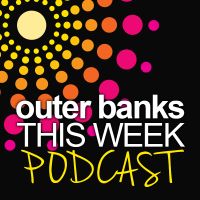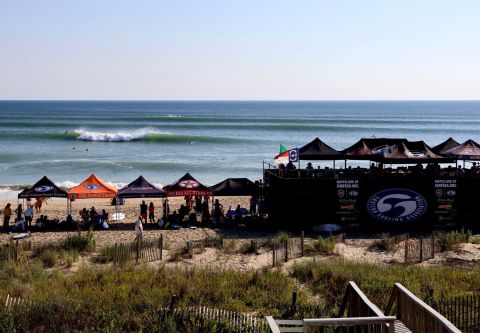Listen To This Article
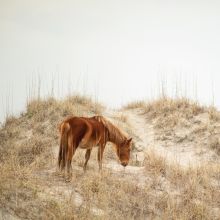
Few sights are more breathtaking and unforgettable than a wild horse prancing in the Outer Banks surf, perched high on a dune or feeding quietly in a field.
Banker horses have roamed freely on the Outer Banks for more than 500 years, since they were originally brought here by Spanish explorers. One of the two last remaining Banker herds in the world lives north of Corolla, from where N.C. Highway 12 turns from pavement to sand to the Virginia line. The wild horses have miraculously adapted to the barrier island environment, surviving unforgiving hurricanes, global warming, life-threatening bacterial infections and unprecedented development and tourism.
While the horses’ beauty and resiliency are unquestionable, protecting the national treasures and living legacies is an important and enormous undertaking – one that requires each of us to heed the call for vigilance.
Thankfully, leading the charge are the skilled and caring employees and volunteers of the Corolla Wild Horse Fund (CWHF), founded in 1989 when a group of caring citizens recognized the need to heighten awareness and address preventable horse fatalities. Educating, advocating, protecting and caring for the miraculous and majestic wild horses are the cornerstones of the Fund’s work.
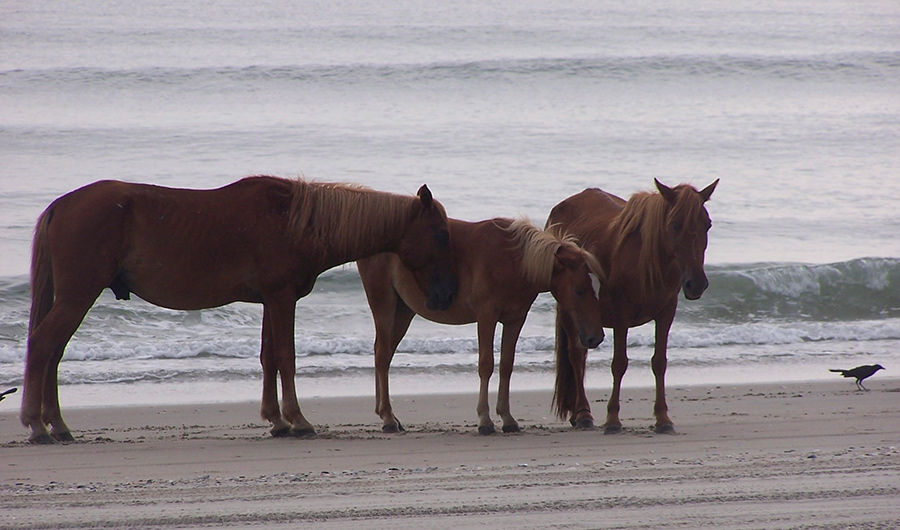
Managing wild horses on 7,544 acres of diverse habitat that includes roughly 750 houses and thousands of people and vehicles presents many complex challenges. As the guardians of the wild herd, the staff and volunteers of the CWHF are on call 24/7.
“The horses are so special and carry such scientific and cultural significance,” says Jo Langone, longtime advocate and former COO of the Corolla Wild Horse Fund, with an undeniable conviction. “There is no longer just a desire to protect these amazing creatures, but an absolute necessity. We want to see them thrive, not only survive, and that’s contingent on continued vigilance for them.”
Special. Miraculous. Resilient. Heroic. Stunning. These are words often used to describe the wild horses and their mind-blowing story of survival since their arrival to an unrelenting environment in the 16th century. Their legendary tale of survival is chronicled in the 30-minute documentary The Secret of Corolla. To view the film, visit the CWHF website.
What sets the Banker horses apart from any other horses in this country is their ability to adapt and survive inherent in their recognition as a landrace breed, meaning they’ve genetically adapted to and can survive their unique habitat; possess distinctive and identifiable traits; have not been purposefully improved by the introduction of domestic, standard-sized stock; and have a historical origin in a specific region.
“What’s remarkable is that DNA testing shows there’s been no genetic drift,” Langone explains. “The horses have the same genetic markers as they did more than 500 years ago.”
While respecting the delicate balance of wild horses living in their element may seem like common sense, the harsh reality is that the number of horses dying from preventable causes – bacterial infections, colic or being fatally struck by a car – is on the rise.
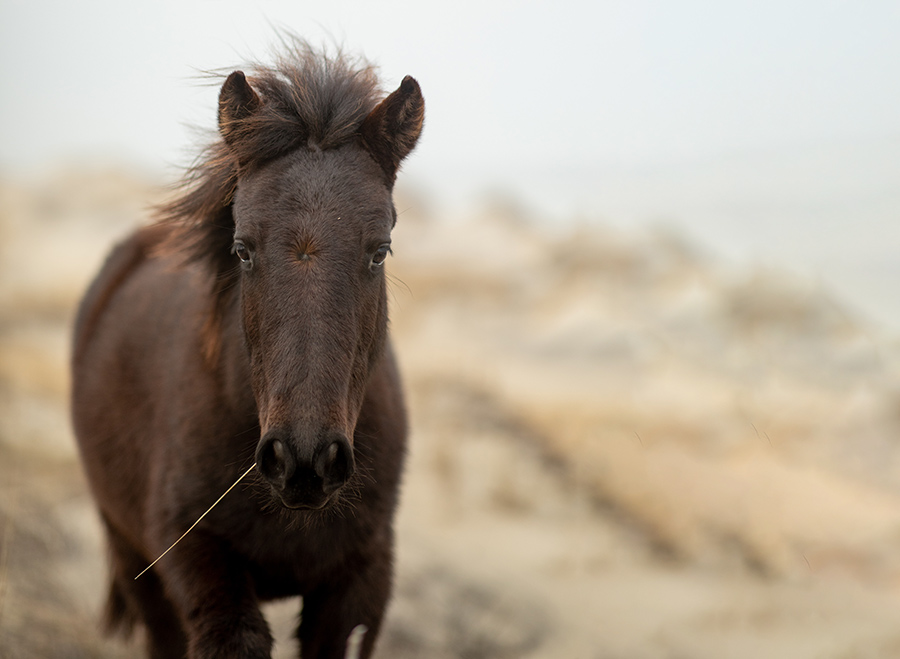
A 1926 National Geographic article cites the number of wild horses on the Outer Banks as between 5,000 and 6,000. Today, the herd count hovers at around 100 horses, which explains their designation as a critically endangered breed. CWHF Director of Herd Management Meg Puckett says that the massive influx of people coming to the Outer Banks and the related development has had a major impact.
“When a 20-bedroom home is built on the dune,” Puckett explains, “it’s not the loss of land that creates the biggest challenge for the horses, but the trickle-down effect of 10 or more cars, increased waste being flushed into the ground and garbage cans full of harmful food being left open.”
Other very real threats to the wild horses are drivers not obeying speed limits and people ignoring the mandate to stay 50 feet away. In July 2023 the community was devastated when Thicket, a young stallion in his prime, had to be euthanized after sustaining injuries in a hit-and-run accident. Just two weeks later, Cora Mae, a teenage mare who foaled many times, was struck by a vehicle and had to be humanely euthanized. There is no telling how many future generations died with Thicket and Cora Mae. These events serve as a stern reminder that we can and must do better in our guardianship of these treasured animals.
“We can’t afford to lose a single member of this endangered herd due to human irresponsibility,” Puckett says emphatically. “They have lived here for hundreds of years. Who are we to mess with that?”
Puckett urges everyone to realize that their actions have far-reaching consequences.
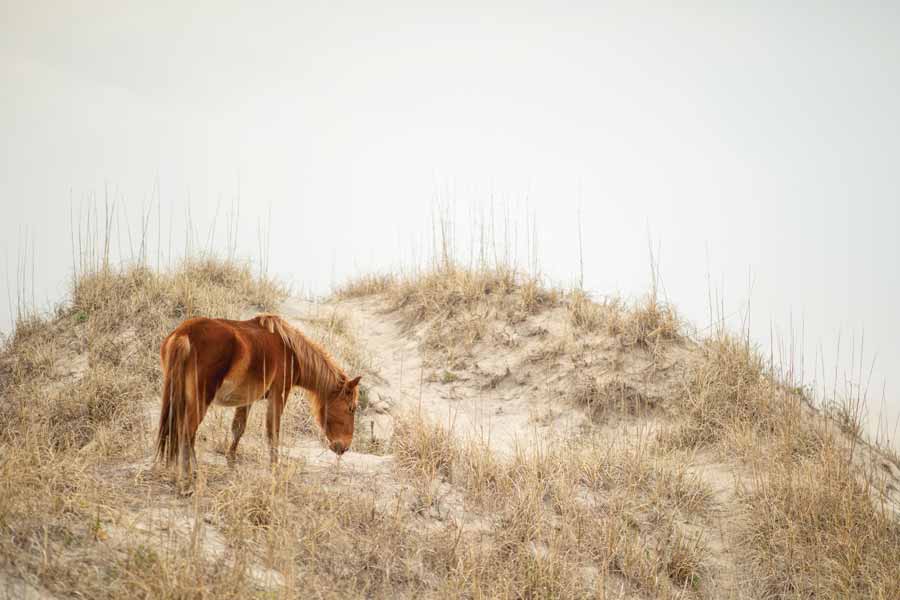
“Each person who sets foot on the beach to see the horses needs to understand that they are just as responsible for taking care of the horses and ensuring the herd’s survival as those who are employed or volunteering,” she says.
The good news is that protecting the endangered herd is quite literally in our hands. Whether those hands are holding an apple, a steering wheel, a camera or enjoying the opportunity to live for a week or more among the horses, understanding the impact of our actions through education and awareness is paramount. As the saying goes, it takes a village.
“People need to appreciate how lucky we are to see the horses in their natural environment,” says Puckett, who epitomizes the traits of a genuine horse whisperer. “Please don’t take their existence for granted. Follow the rules and slow down and don’t feed them so they will continue to thrive for many more years. It’s absolutely possible to live in harmony with them, to watch them and love them and appreciate everything about them, without getting close or feeding them. It takes very little energy to do the right thing.”
When asked what the highly intuitive and intelligent horses would want to tell us if they could talk, Puckett does not hesitate: “We’re good. We got this. We know how to survive. Please just let us live naturally and be free and wild.”
And that, my friends, is straight from the horse’s mouth.
Protecting the Wild Horses: It’s Up to Us
Corolla Wild Horse Fund is a nonprofit that relies on the generosity of the public for funding. To learn more or to donate, visit: corollawildhorses.org or Facebook.com/corollawildhorses.org
- Never feed a wild horse. An apple, carrot or any human food can kill them.
- Stay at least 50 feet away from the horses, for their protection and your own.
- Slow down and stay alert when driving on the beach or back roads north of Corolla.
- If you are staying on the northern beaches, be sure to tightly secure all trash cans and never leave trash, food scraps or food outside or on the beach where the horses could access it.
- Horse tours, rather than driving the area yourself, are much easier and more effective ways to view the horses.
- If you see a horse in trouble or see someone harassing a horse, call Currituck County Dispatch at (252) 453-3633 or the Corolla Wild Horse Fund at (252) 453-8002
(252) 453-8002
1130E Corolla Village Road, Corolla

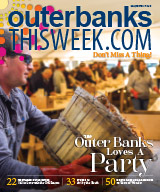
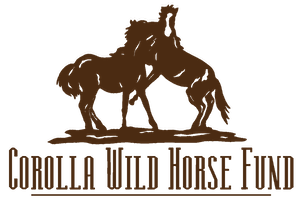
 Dianne Beard is a freelance writer, intuitive mindfulness teacher, workshop facilitator and speaker who is passionate about the positive shifts people make when they slow down and access their innate wisdom. She is thrilled to call the Outer Banks her home and spends her free time exploring its endless gems on foot, bike, kayak, SUP or whatever gets her up close and personal with nature. Find her online at dibeard.com.
Dianne Beard is a freelance writer, intuitive mindfulness teacher, workshop facilitator and speaker who is passionate about the positive shifts people make when they slow down and access their innate wisdom. She is thrilled to call the Outer Banks her home and spends her free time exploring its endless gems on foot, bike, kayak, SUP or whatever gets her up close and personal with nature. Find her online at dibeard.com.

